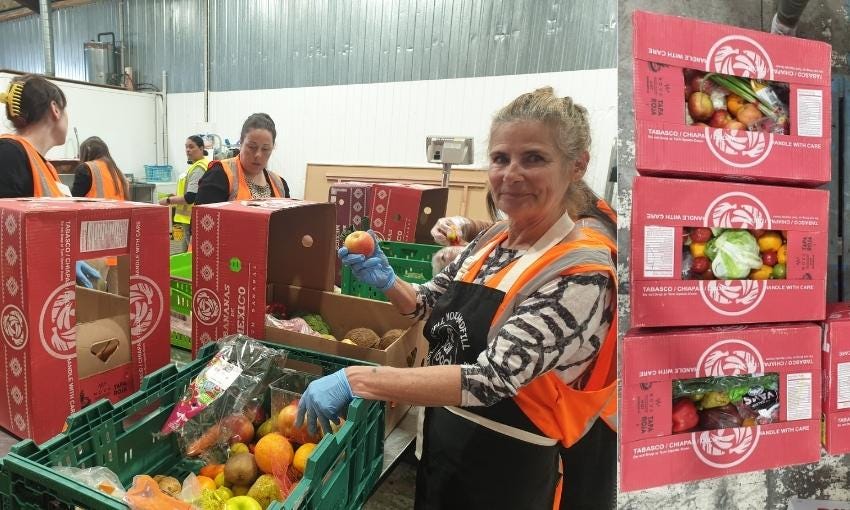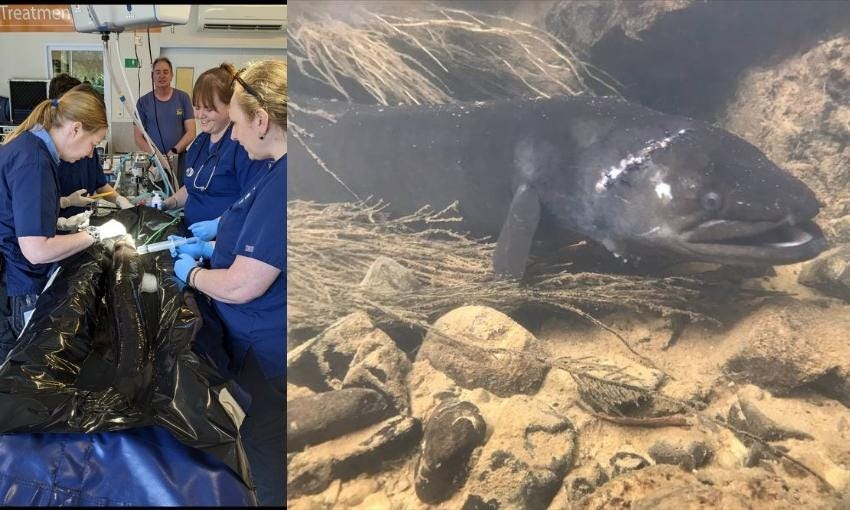Food rescue is helping people and the climate
Globally, food waste contributes 8-10% to climate pollution – around four times more than the entire aviation industry.
Kia ora and welcome to Future Proof, brought to you by Electric Kiwi.
Volunteers at Fair Food hand-sort rescued produce into boxes that rival My Food Bag.
When I arrive at the Fair Food headquarters in Avondale, general manager Michelle Blau offers me an “upcycled” banana muffin, made with bananas and baking mix that would’ve otherwise ended up in landfill. It’s pretty tasty.
Every day, the food rescue charity picks up at least a tonne of fresh food from grocery stores, hand-sorts it and packages it up for organisations – from churches to women’s refuges to a new mothers’ group. What started out as a grassroots initiative sorting food on a ping-pong table in 2011 has now grown to include a fleet of four vans, and an efficient operation delivering millions of meals across West Auckland every year.
Tackling climate change and poverty simultaneously
“When we think about climate and social solutions that go together, we’re doing it,” says Michelle. Around a third of all food produced is wasted – in New Zealand alone, we’re chucking out around 300,000 tonnes every year. That’s 30 times heavier than the Eiffel Tower.
Food waste contributes 8-10% of global climate pollution – a proportion four times larger than the aviation industry. This pollution originates from the wasted carbon emissions that went into producing a piece of food and transporting it, as well as the methane that’s released by food rotting in landfill.
Rescued food not enough to satiate demand
While we’re wasting all this food, up to 40% of New Zealanders may experience food insecurity, and for 7% this can be severe – meaning going a day or more without food. This failure to link up good food with people who need it is a symptom of a broken system, further exacerbated by the cost of living crisis. Food rescue steps in to fill a gap that shouldn’t be there. “We don’t celebrate growth in our industry,” says Michelle.
But the industry has grown, especially in the wake of the pandemic. Lockdowns wreaked havoc with supply chains, creating food surplus haphazardly, while more people than ever needed to access rescued food as economic turmoil upended lives. “Last year, we processed 2.2 million meals’ worth of food, and we could do more,” says Michelle. “Every single day, we don’t have enough to meet demand.” They’re not alone: food rescue operations have sprung up across the country. Collectively, they rescued 7,641,627kg of food, saving an estimated 20,250 tonnes of CO2 in 2021.
Kai handled with aroha and care
A group of volunteers arrives and dons high-vis vests and gloves to hand-sort today’s haul of rescued food. There are fresh fruit and veges lovingly spruced up and assembled into boxes, ready to eat. One of the volunteers, Eglee, is from Brazil, where “a lot of people are hungry,” she says. “To see good food go to the rubbish hurts my heart.”
Other produce is more suited to cooking and some of it will stay here in the Fair Food kitchen to be rustled up into something tasty – with tomato season approaching, huge batches of tomato sauce are on the menu. Some produce is too far gone for people, but makes perfect tucker for pigs, so that’s where it goes: to a pig farm.
This process can generate a tasty meal for just 40 cents in operating costs. “Our kind of secret sauce is that we know the food’s getting eaten because we know the culturally responsive and appropriate and dignified way to provide food,” says Michelle. “We have had a decade to figure out what works for our home community and for the 40-ish charities that we see every single week.”
‘Your nose is your best indicator’
Fair Food has clear guidelines for packaged food featuring use-by and best-before dates. But the window of edibility for some products might surprise you: “Butter, for Christ's sake! Nine freakin’ months that bad boy will last,” Michelle says. She’s worried that we’ve become trapped in a perfection standard, and that many people don’t get the difference between use-by and best-before dates. Perhaps a “packaged on” date combined with greater awareness of shelf life would be more helpful for consumers and generate less waste, she suggests. But ultimately, Michelle says, “your nose tells you the best before date!”
Electric Kiwi wants to make broadband better for all Kiwis
This means offering a fair price and providing great service, but without any contracts, notice periods or exit fees. Electric Kiwi believe all Kiwis deserve fairer broadband, including daily charges so you’ll never pay for any extra days if you need to leave.
So pick up Sweet Fibre from $2.65 per day and get a free Orbi Wifi 6 modem. Plus, get 2 months free Broadband if you join before November 30, 2022. T+Cs apply.
Grim reports released ahead of Cop27
In confronting news ahead of the upcoming global climate summit in Egypt, the UN Environment Programme has released a report that sums up worldwide climate efforts as “woefully inadequate”. The goal of limiting warming to within 1.5C is in peril, as it looks like we’re heading for 2.4-2.6C warming instead. Stuff’s Olivia Wannan rounds up the climate heroes and villains according to the report’s findings.
Meanwhile, the World Meteorological Organisation has released its report on greenhouse gas measurements from 2021, with the big three of carbon dioxide, methane and nitrous oxide all reaching record highs. But there are still signs of real progress, writes Nick O’Malley, the national environment and climate editor for the Sydney Morning Herald. In 2023, the next round of climate talks (Cop28) will be held in the United Arab Emirates – one of the world’s biggest oil producers. Elizabeth Gibney examines what Middle Eastern oil giants are doing as the world shifts away from fossil fuels.
Deep sea mining update
We talked about deep-sea mining a while ago in Future Proof, and now the New Zealand government has announced it‘s backing the call for a temporary ban on the practice in international waters, just as the International Seabed Authority begins negotiations. The Cook Islands, who are actively pursuing deep sea mining, aren’t on board with New Zealand’s support for the moratorium movement (paywalled).
The science of attribution paves the way for more climate legal cases
In the last few years, we’ve vastly improved our understanding of how climate change contributes to natural disasters like bushfires, floods and hurricanes. Now activists are taking advantage of this to sue for climate damage that’s already been dealt. Isabella Kaminski reports on cases from the US, Australia and Indonesia for Hakai Magazine. Closer to home, New Zealand is one of 11 nations supporting Vanuatu in its quest to clarify nations’ human rights obligations when it comes to climate change, Newsroom’s Marc Daalder writes.
Inside the murky world of plastic recycling
You might’ve heard of TerraCycle – a company that takes hard-to-recycle items (like cigarette butts and laminated juice pouches) and purportedly recycles them. Leslie Kaufman from Bloomberg embarks on a fascinating journey to meet TerraCycle’s founder (“Sort of Silicon Valley meets your dumpster”) and even attempts to track pieces of plastic through TerraCycle’s process.
Mapping the world’s methane super-emitters
In July this year, NASA launched a new satellite to detect mineral dust in the atmosphere. In the space of 3.5 months, the satellite did find some of these dust plumes – but also found more than 50 methane super-emitters including some previously unseen. Methane super-emitters include oilfields, landfills and animal feedlots. Understanding these polluting sites is an important first step to addressing the super-emitter problem.
The stories we tell about climate change and the environment matter. I've been writing The Spinoff's weekly Future Proof newsletter since July, sharing hopeful but honest news about the climate and our natural world. It's rewarding work – showcasing the people, mahi and solutions that will help us navigate the climate crisis.
I feel so lucky to have a dedicated space to connect with readers like you, where we can kōrero with hope instead of doom and gloom. Too often newsrooms and media publications relegate environment and science to the sidelines, but through Future Proof, The Spinoff is giving te taiao the attention it deserves.
If you care about empowering climate and environmental journalism grounded in evidence, please support our work by donating today.
More stories:
The EU has joined the club of jurisdictions banning new fossil fuel-powered cars by 2035.
Time to get rid of the lawn: your perfectly manicured backyard of mown grass is probably emitting carbon, rather than storing it, according to new research.
It’s the dawn of a new wrenaissance, as the pīwauwau rock wren wins Bird of the Year 2022. A stunning photograph of the teeny mountain-dwelling bird also took out the People’s Choice Award at New Zealand Geographic’s Photographer of the Year awards.
A proposal to create a marine protected area off the southeast coast of the South Island is “stuck” after more than a decade of wrangling, Andrea Vance reports for Stuff.
Deforestation slowed last year, according to a new report, but not enough to slow climate change.
The Butterfly Discovery Project is on a mission to untangle the secrets of our native copper butterflies. How many species are there, and are any heading towards extinction?
Please stop chucking your unwanted goldfish into waterways and spawning 1.8kg river monsters, thanks.
Left: Tina Tuna undergoing an operation at Wellington Zoo. Right: Tina Tuna all stitched up and back in her home. Image credit: Tim Park.
To finish this edition, I’m sending best wishes and all the h-eel-ing vibes to Tina Tuna the longfin eel. Tina was spotted in Ōtari-Wilton’s Bush with a gnarly head wound. She was scooped up by bush manager Tim Park and transported via eel ambulance (aka Tim’s tramping pack) to the wildlife hospital at Wellington Zoo. Tina was successfully stitched up and given some antibiotics and TLC before being released yesterday.
Hope you’re eelin’ great,
Ellen
Got some feedback about Future Proof or topics you’d like covered? Get in touch with me at futureproof@thespinoff.co.nz














